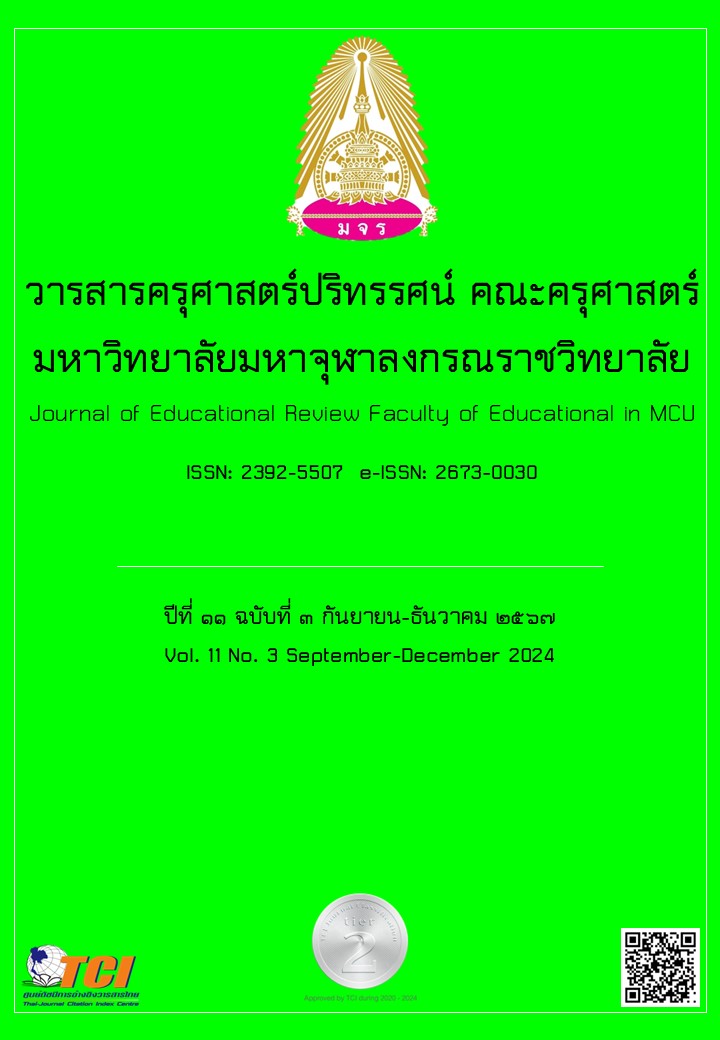THE GUIDELINES FOR STRENGTHENING VISIONARY LEADERSHIP OF SCHOOL ADMINISTRATORS IN THE NAKHON SAWAN PRIMARY EDUCATIONAL SERVICE AREA 1 ACCORDING TO PĀPAṆIKA-DHAMMA
Main Article Content
Abstract
This research aims to 1) study the visionary leadership of school administrators and 2) find ways to enhance visionary leadership of school administrators according to the Pāpaṇika-dhamma principle (Qualities of a successful businessman). It is a mixed-method research. The quantitative research used a questionnaire with a sample of 292 people. The data were analyzed using research statistics, including frequency, percentage, mean, and standard deviation. The qualitative research used interviews with 9 key informants. The results of the research found that 1) the visionary leadership of school administrators in the Nakhon Sawan Primary Educational Service Area 1 overall had the highest opinions. When considering each aspect, the opinions were at the highest levels in all 4 aspects: being a good role model, disseminating vision, practicing vision, and creating vision, respectively. 2) The guidelines for enhancing visionary leadership of school administrators according to the Pāpaṇika-dhamma principle consisted of (1) Creating vision, supporting school administrators in systematically compiling information to be used to determine the vision so that administrators had the knowledge and ability to manage and use modern digital technology devices. (2) Disseminating vision, setting a plan for school administrators to hold meetings with parents of students to exchange opinions with teachers and parents of students and disseminate the vision, learning techniques through various communication channels. (3) Vision practice, promoting educational institution administrators to have a process for planning operations according to the vision, in supervising, evaluating, following up and reporting the results of operations according to the vision using digital technology. (4) Being a role model, promoting educational institution administrators to create networks for developing morality and ethics, promoting administrators to use digital technology in evaluating, developing morality, ethics, morality, ethics and announcing the honors of good administrators.
Article Details

This work is licensed under a Creative Commons Attribution-NonCommercial-NoDerivatives 4.0 International License.
ทัศนะและความคิดเห็นที่ปรากฏในบทความในวารสารฉบับนี้ถือเป็นความรับผิดชอบของผู้เขียนบทความนั้นเพียงผู้เดียว และไม่ถือเป็นทัศนะและความรับผิดชอบของกองบรรณาธิการ
กองบรรณาธิการขอสงวนสิทธิ์ในการคัดเลือกบทความลงตีพิมพ์และจะแจ้งให้เจ้าของบทความทราบหลังจากผู้ประเมินบทความตรวจอ่านบทความแล้ว
ต้นฉบับที่ได้รับการตีพิมพ์ในวารสารครุศาสตร์ปริทรรศน์ คณะครุศาสตร์ มหาวิทยาลัยมหาจุฬาลงกรณราชวิทยาลัย ถือเป็นกรรมสิทธิ์ของคณะครุศาสตร์ มหาวิทยาลัยมหาจุฬาลงกรณราชวิทยาลัย ห้ามนำข้อความทั้งหมดหรือบางส่วนไปพิมพ์ซ้ำ เว้นเสียแต่ว่าจะได้รับอนุญาตจากมหาวิทยาลัยฯ เป็นลายลักษณ์อักษร
References
กระทรวงศึกษาธิการแนวทางการจัดกิจกรรมพัฒนาผู้เรียน. (2545). หลักสูตรแกนกลางการศึกษาขั้นพื้นฐาน. กรุงเทพมหานคร: โรงพิมพ์ชุมนุมสหกรณ์การเกษตรแห่งประเทศไทย.
ทองคำ พิมพา. (2556). การศึกษาความสัมพันธ์ระหว่างวิสัยทัศน์และภาวะผู้นำการเปลี่ยนแปลงกับการบริหารงานวิชาการของผู้บริหารโรงเรียนมัธยมศึกษาจังหวัดอ่างทอง. สารนิพนธ์การศึกษามหาบัณฑิต. มหาวิทยาลัยศรีนครินทรวิโรฒ.
สมชาย เทพแสง. (2552). ภาวะผู้นำวิสัยทัศน์: รูปแบบใหม่ของผู้บริหารโรงเรียนในทศวรรษหน้า. วารสารบริหารการศึกษา. 3(12). 5-8.
สำนักงานเขตพื้นทีการศึกษาประถมศึกษานครสวรรค์ เขต 1. (2563). แผนปฏิบัติการประจำปี งบประมาณ 2565. นครสวรรค์: สำนักงานเขตพื้นที่การศึกษาประถมศึกษานครสวรรค์ เขต 1.
สำนักงานคณะกรรมการการศึกษาขั้นพื้นฐาน. (2553). คู่มือการบริหารจัดการระบบคุณภาพโรงเรียนมาตรูฐานสากล. กรุงเทพมหานคร: ชุมนุมสหกรณ์การเกษตรแห่งประเทศไทย.
สุเทพ พงศ์ศรีวัฒน์. (2545). ภาวะผู้นำ : ทฤษฎีและปฏิบัติ. เชียงราย: สถาบันราชภัฎเขียงราย.


